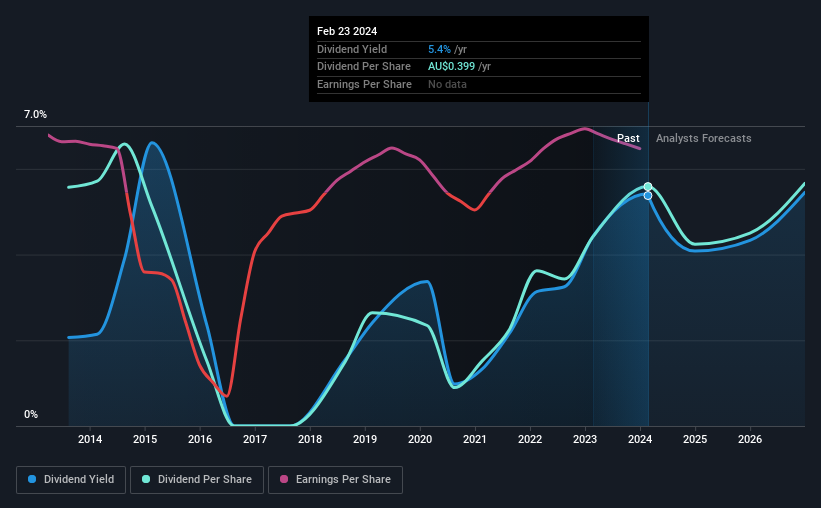Should Income Investors Look At Santos Limited (ASX:STO) Before Its Ex-Dividend?
Santos Limited (ASX:STO) stock is about to trade ex-dividend in two days. The ex-dividend date is one business day before a company's record date, which is the date on which the company determines which shareholders are entitled to receive a dividend. The ex-dividend date is important because any transaction on a stock needs to have been settled before the record date in order to be eligible for a dividend. Accordingly, Santos investors that purchase the stock on or after the 26th of February will not receive the dividend, which will be paid on the 27th of March.
The company's next dividend payment will be US$0.175 per share, on the back of last year when the company paid a total of US$0.26 to shareholders. Calculating the last year's worth of payments shows that Santos has a trailing yield of 5.4% on the current share price of AU$7.42. If you buy this business for its dividend, you should have an idea of whether Santos's dividend is reliable and sustainable. So we need to check whether the dividend payments are covered, and if earnings are growing.
View our latest analysis for Santos
Dividends are typically paid out of company income, so if a company pays out more than it earned, its dividend is usually at a higher risk of being cut. Santos is paying out an acceptable 60% of its profit, a common payout level among most companies. Yet cash flow is typically more important than profit for assessing dividend sustainability, so we should always check if the company generated enough cash to afford its dividend. It paid out 87% of its free cash flow as dividends, which is within usual limits but will limit the company's ability to lift the dividend if there's no growth.
It's encouraging to see that the dividend is covered by both profit and cash flow. This generally suggests the dividend is sustainable, as long as earnings don't drop precipitously.
Click here to see the company's payout ratio, plus analyst estimates of its future dividends.
Have Earnings And Dividends Been Growing?
Companies with consistently growing earnings per share generally make the best dividend stocks, as they usually find it easier to grow dividends per share. If earnings fall far enough, the company could be forced to cut its dividend. This is why it's a relief to see Santos earnings per share are up 7.6% per annum over the last five years. Decent historical earnings per share growth suggests Santos has been effectively growing value for shareholders. However, it's now paying out more than half its earnings as dividends. Therefore it's unlikely that the company will be able to reinvest heavily in its business, which could presage slower growth in the future.
The main way most investors will assess a company's dividend prospects is by checking the historical rate of dividend growth. It looks like the Santos dividends are largely the same as they were 10 years ago.
To Sum It Up
Is Santos worth buying for its dividend? Earnings per share growth has been unremarkable, and while the company is paying out a majority of its earnings and cash flow in the form of dividends, the dividend payments don't appear excessive. Overall we're not hugely bearish on the stock, but there are likely better dividend investments out there.
If you're not too concerned about Santos's ability to pay dividends, you should still be mindful of some of the other risks that this business faces. Our analysis shows 1 warning sign for Santos and you should be aware of this before buying any shares.
A common investing mistake is buying the first interesting stock you see. Here you can find a full list of high-yield dividend stocks.
Have feedback on this article? Concerned about the content? Get in touch with us directly. Alternatively, email editorial-team (at) simplywallst.com.
This article by Simply Wall St is general in nature. We provide commentary based on historical data and analyst forecasts only using an unbiased methodology and our articles are not intended to be financial advice. It does not constitute a recommendation to buy or sell any stock, and does not take account of your objectives, or your financial situation. We aim to bring you long-term focused analysis driven by fundamental data. Note that our analysis may not factor in the latest price-sensitive company announcements or qualitative material. Simply Wall St has no position in any stocks mentioned.

